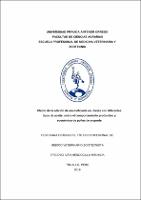Efecto de la adición de emulsificante en dietas con diferentes tipos de aceite, sobre el comportamiento productivo y económico de pollos de engorde

View/
Download
(application/pdf: 800.4Kb)
(application/pdf: 800.4Kb)
Date
2017Author(s)
Mendocilla Miranda, Efigenio Ivan
Metadata
Show full item recordAbstract
El objetivo de esta tesis fue evaluar el efecto del uso del
ricinoleato de gliceril polietilenglicol como emulsificante, y aceite de soya y
palma en la dieta de pollos de engorde, sobre el comportamiento
productivo y económico de la crianza. Se utilizó 200 pollos de engorde
machos de la línea cobb500, de un día de edad, con peso inicial promedio
de 45.6 g, evaluados por 42 días en cuatro fases: inicio (1-7 días),
crecimiento (8-21 días), engorde (22-33 días) y acabado (34-42 días). Las
aves fueron distribuidas mediante un diseño completamente al azar con
arreglo factorial 2 x 2 (tipo de aceite y emulsificante) con cuatro
tratamientos (aceite de palma sin emulsificante, aceite de palma con
emulsificante, aceite de soya sin emulsificante y aceite de soya con
emulsificante) y cinco repeticiones. Las dietas fueron formuladas para
atender las necesidades nutricionales de las aves en cada fase teniendo
el mismo valor nutricional y energético. Los resultados fueron analizados a
través del análisis de varianza y los promedios comparados por la prueba
de Tukey. No hubo interacción significativa entre tipo de aceite y
emulsificante, por lo que, los factores se evaluaron de forma
independiente; las mayores ganancias de peso (P<0.05) se obtuvieron en
dietas que contenían aceite de soya durante la fase de inicio (1-7 días) y
en el periodo total (1-42 días), así como en dietas que contenían
emulsificante durante la fase de acabado (34-42 días) y en el periodo total
(1-42 días). De modo similar, se encontró mejor conversión alimenticia
(P<0.05) durante el periodo total (1-42 días) en pollos de engorde que
recibieron dietas que contenían emulsificante. Las mayores
rentabilidades se obtuvieron con aceite de soya y emulsificante, de
manera independiente. El uso de aceite de soya como el suplemento de
emulsificante mejora la ganancia de peso y la rentabilidad de la crianza de
pollos de engorde. The aim of this research was to evaluate the effect of glyceryl
polyethyleneglycol ricinoleate as an emulsifier and 2 types of oil (soybean
and palm) in the diet of broilers on the production performance and
economic of breeding, in 200 male broilers of the cobb500 line, one day
age with initial weight of 45.6gr , evaluated for 42 days in 4 phases; onset
(1-7 days), growth (8-21 days), fattening (22-33 days), and finishing (34-42
days).The broilers were distributed through random design with 2x2
factorial arrangement (oil type and emulsifier) with four treatments (palm
oil with emulsifier, palm oil without emulsifier, soybean oil without
emulsifier , soybean oil with emulsifier) and five repetitions . The diets
were formulated to meet the nutritional needs of broilers chickens at each
phase, having the same nutritional and energetic value. The results were
analyzed through analysis of variance and the means compared by the
Tukey test. There was not significant interaction between the type of oil
and emulsifier, so the factors were evaluated independently. The best
weight gains (P<0.05) were obtained with soybean oil in onset(1-7 days)
and total period (1-42 days), and in diets that contained emulsifier in the
finishing phase (34-42 days), and total period (1-42 days). Similarly, better
feed conversion (P <0.05) was shown during the total period (1-42 days) in
broilers fed diets containing emulsifier; the highest yields were obtained
with soybean oil and emulsifier, independently. The use of soybean oil and
the supplement of emulsifier improve the weight gain and the profitability
of the broiler breeding.
Subject
Collections
- Veterinaria y Zootecnia [196]

